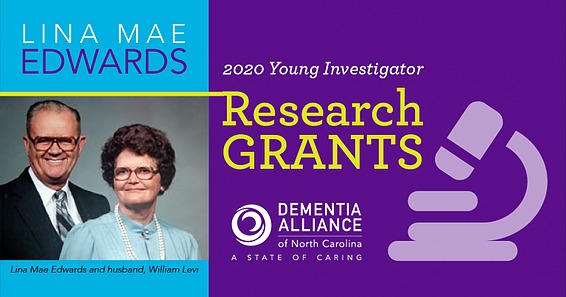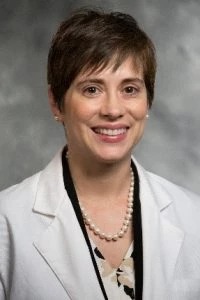
Dementia Alliance of North Carolina is pleased to announce two winners of the 2020 Lina Mae Edwards Young Investigator Research Grants. The grantees, from Duke University and Wake Forest University, will both receive $100,000 over the next two years.
The purpose of Dementia Alliance’s research program is to address important issues ranging across a broad spectrum of concerns in the field of dementia science and caregiver support. The program seeks to discover the basic causes, prevention and cure of these diseases, as well as the most effective approaches to family support and the enrichment of the lives of those who suffer from dementia.
This award was made possible with the support of Guardian Angel Thrift Shops, founded in 1999 and operated in two locations in Central North Carolina by founder, Laura Gaddis, in memory of her mother, Lina Mae Edwards. Thanks to public support, Guardian Angel Thrift Shop has been able to contribute over $2 million for Alzheimer’s Research in our state.
“We are honored to continue this important research program, helping current and future people living with dementia. We are extremely grateful for the support of Guardian Angel Thrift Shop to fund important research right here in North Carolina.” says Heather Hooper, Executive Director of the Dementia Alliance of North Carolina.”
This year’s winners include:

Milta Oyola Little, D.O., Associate Professor of Geriatric Medicine at Duke University. Dr. Little will complete a project entitled, “Implementation of Cognitive Stimulation Therapy across a healthcare system to improve clinical outcomes of individuals living with dementing illnesses.” This project will bring an effective and innovative non-medication therapy to local Individuals living with dementia.
“This grant means so much to my research career. This grant will give me the opportunity to enhance my current knowledge and skills while also making an immediate impact in our community and hopefully opening up further opportunities to expand the reach of this project to provide effective, evidence-based, non-medication treatments to people living with dementia,” says Dr. Little.
People living with mild to moderate dementia may benefit from a group therapy approach known as “Cognitive Stimulation Therapy”, or CST. Controlled studies have shown that CST improves cognitive function, mood, and overall quality of life. Each CST group session is centered on a theme during which participants share their thoughts and opinions, reminisce, and complete cognitive tasks tailored to their abilities. Currently CST is not widely available to those who could benefit. We plan to improve access to this promising therapy by building upon studies completed by researchers in the United Kingdom and in St. Louis, Missouri regarding best practices for implementation. Little’s plan is to develop a model for making CST available in the community, measuring clinical outcomes as well as effective strategies for implementing this program across various site.

Dr. Shivani Ghoshal Assistant Professor of Neurology with Wake Forest University’s project titled “Impact of TCD Cerebral Hemodynamics During Dialysis on Cognitive Decline and Cerebral Structural Change” will look at how Reductions in cerebral perfusion, reflected on brain MRI by increased scarring and atrophy, are linked to cognitive impairment. There is a clinical need for cost-effective measures of cerebral blood flow during dialysis. Her project’s goal is to establish TCD IDCV and TCD PI as non-invasive imaging markers for future cognitive impairment in patients on dialysis.
Dr. Ghoshal’s DANC grant will allow to her to apply her expertise in transcranial Doppler (TCD) ultrasound to non-invasively follow changes in brain blood flow in dialysis and their effect on brain structure and cognitive decline over time. This project will be the first to start to establish TCD as a cost-effective imaging screen which may be useful to predict future cognitive decline in patients on dialysis.





















0 comments